Table of Contents
Introduction
In digital marketing, understanding user search behavior is essential for creating effective content. Answer-based content, which focuses on providing clear and valuable responses to user queries, has become a leading strategy.
As search engines advance, they prioritize content that directly answers user questions. This change requires brands and marketers to reconsider how they organize and present information online.
Answer-based content not only enhances visibility but also builds trust and authority with audiences. By meeting search content head-on, businesses can position themselves as reliable sources, driving both engagement and conversions.
Understanding Answer-Based Content
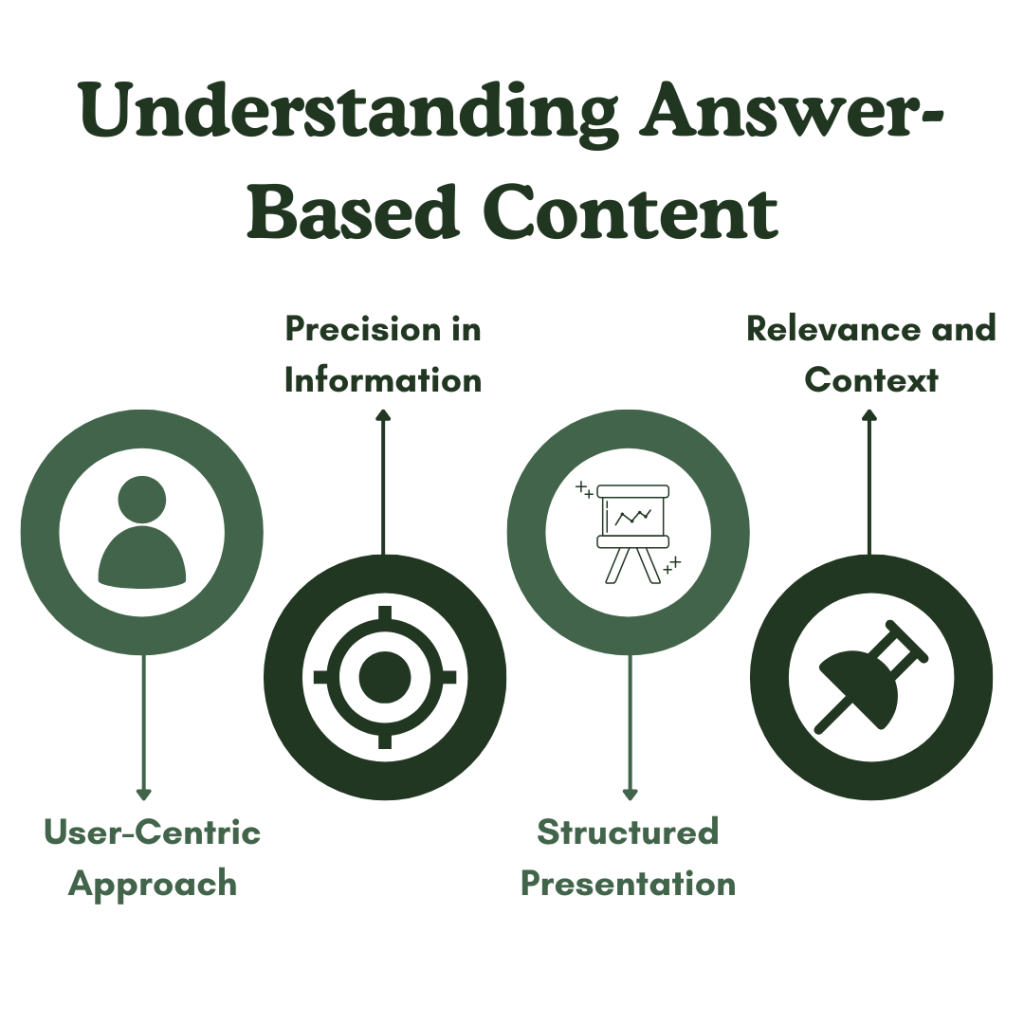
Answer-based content refers to the purpose behind a user’s search — specifically, when they seek clear, concise, and factual information rather than general content.
- User-Centric Approach: Answer-based content starts with understanding the audience — their questions, challenges, and search behavior. Content built around user content connects more deeply, providing value that goes beyond keywords or optimization tricks.
- Precision in Information: This kind of content prioritizes clarity and precision rather than the number of words. Users look for straightforward answers instead of extensive explanations.
- Structured Presentation: The manner in which information is presented is equally important as the content itself. Well-structured sections enhance the scannability and digestibility of content, aligning perfectly with the way users seek quick answers online.
- Relevance and Context: Answer-based content must stay tightly relevant to the query. Adding meaningful context — examples, short insights, or related data — reinforces trust and shows both users and search engines that the content is authoritative and useful.
Understanding this concept helps marketers craft content that directly satisfies what users want to know, improving both ranking potential and user experience.
Types of Answer-Based Content
Answer-based content can take different forms depending on the nature of the user’s query. Each type serves a unique purpose — from addressing simple questions to solving complex problems.
FAQs (Frequently Asked Questions)
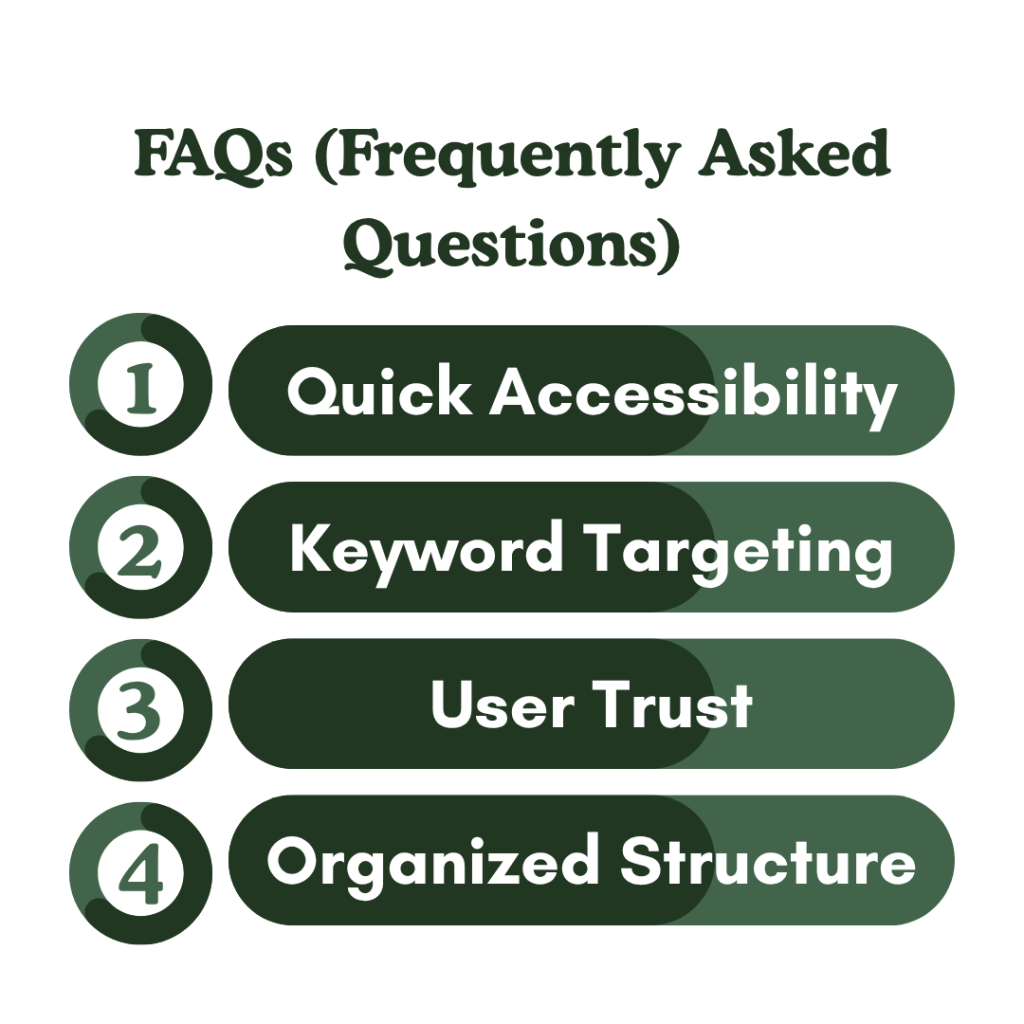
FAQs simplify information delivery by addressing the most common user queries directly. They provide instant answers while enhancing a website’s overall user experience.
- Quick Accessibility: FAQs provide information in concise, easily digestible segments, enabling users to locate solutions without having to scroll through extensive content.
- Keyword Targeting: Each question inherently incorporates high-content keywords that correspond with actual search queries, enhancing visibility on search engine results pages (SERPs).
- User Trust: By proactively addressing and resolving potential issues, FAQs establish the brand as open, trustworthy, and centered on customer needs.
- Organized Structure: The systematic question-and-answer format facilitates efficient crawling and interpretation of information for both users and search engines.
How-to Guides
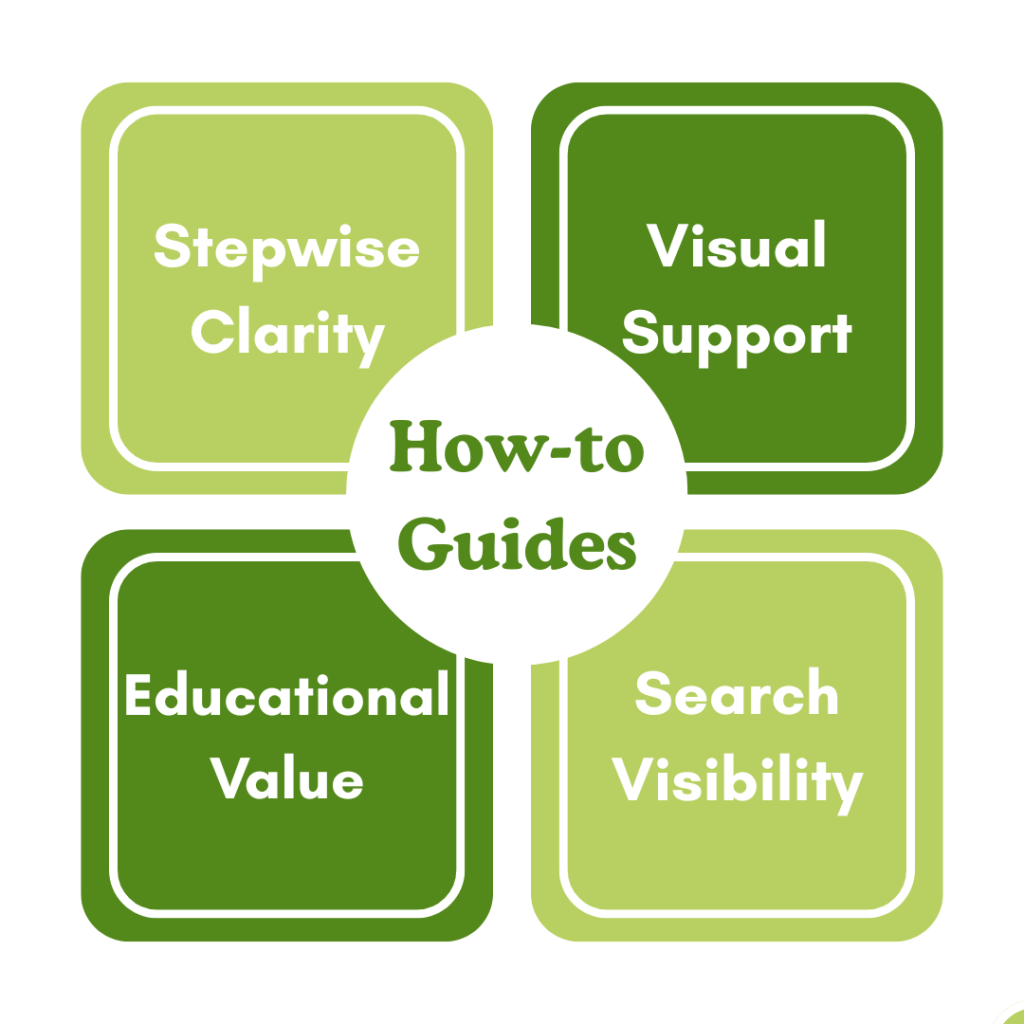
How-to guides are instructional by nature, guiding users through specific processes. They answer queries in a structured, actionable way that builds authority and engagement.
- Stepwise Clarity: Complex topics are simplified into clear, ordered steps, ensuring readers can follow along with ease.
- Visual Support: Incorporating visuals like screenshots, infographics, or short videos enhances comprehension and keeps readers engaged.
- Educational Value: These guides establish credibility by offering genuine solutions and actionable insights that users can implement immediately.
- Search Visibility: Because of their clarity and structure, how-to guides often capture featured snippets or “People Also Ask” spots on Google.
Case Studies
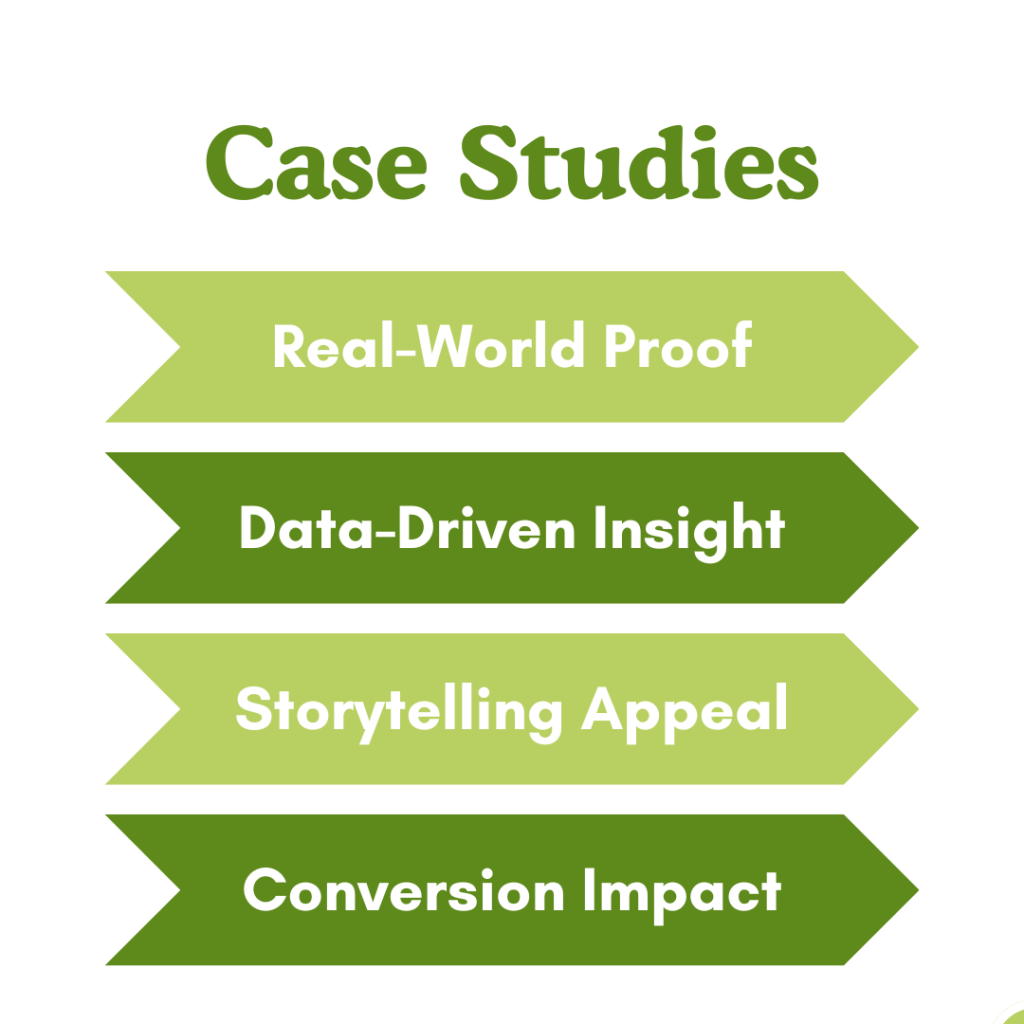
Case studies transform experience into expertise by presenting real-world examples of success or strategy.
- Real-World Proof: Demonstrates the effectiveness of a product or service through actual results, helping audiences visualize success.
- Data-Driven Insight: Uses measurable metrics, charts, and outcomes to support claims, adding authenticity and credibility.
- Storytelling Appeal: Combines facts with engaging narratives, creating a balance of logic and emotion that resonates with readers.
- Conversion Impact: Builds confidence and inspires decision-making, often turning prospects into loyal customers or clients.
Benefits of Answer-Based Content
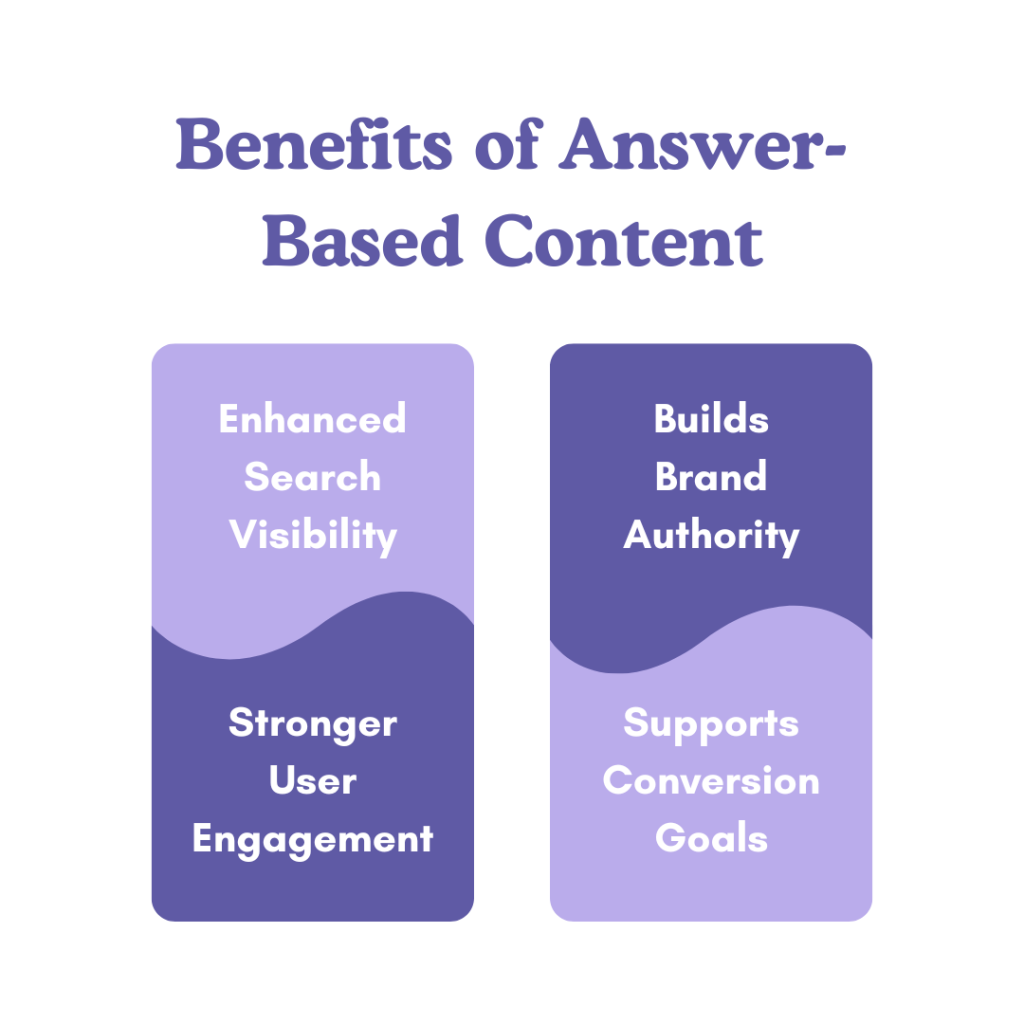
Answer-based content isn’t just about providing information — it’s about shaping how users connect with your brand.
- Enhanced Search Visibility: Search engines reward content that directly satisfies user intent. When you structure answers clearly, your chances of ranking in featured snippets, voice search results, and “People Also Ask” sections increase dramatically.
- Stronger User Engagement: Users are more likely to stay on a page that gives them quick, reliable answers. Answer-based content keeps them reading longer, exploring related pages, and engaging more deeply with your brand.
- Builds Brand Authority: By consistently delivering valuable, factually correct information, you position your brand as a trusted resource. Over time, this credibility attracts organic backlinks, shares, and repeat visitors.
- Supports Conversion Goals: When users find what they’re looking for easily, they’re more likely to take action — whether it’s making a purchase, signing up, or contacting the business. Answer-based content nurtures that trust-to-action journey.
Tips to Create Answer-Based Content
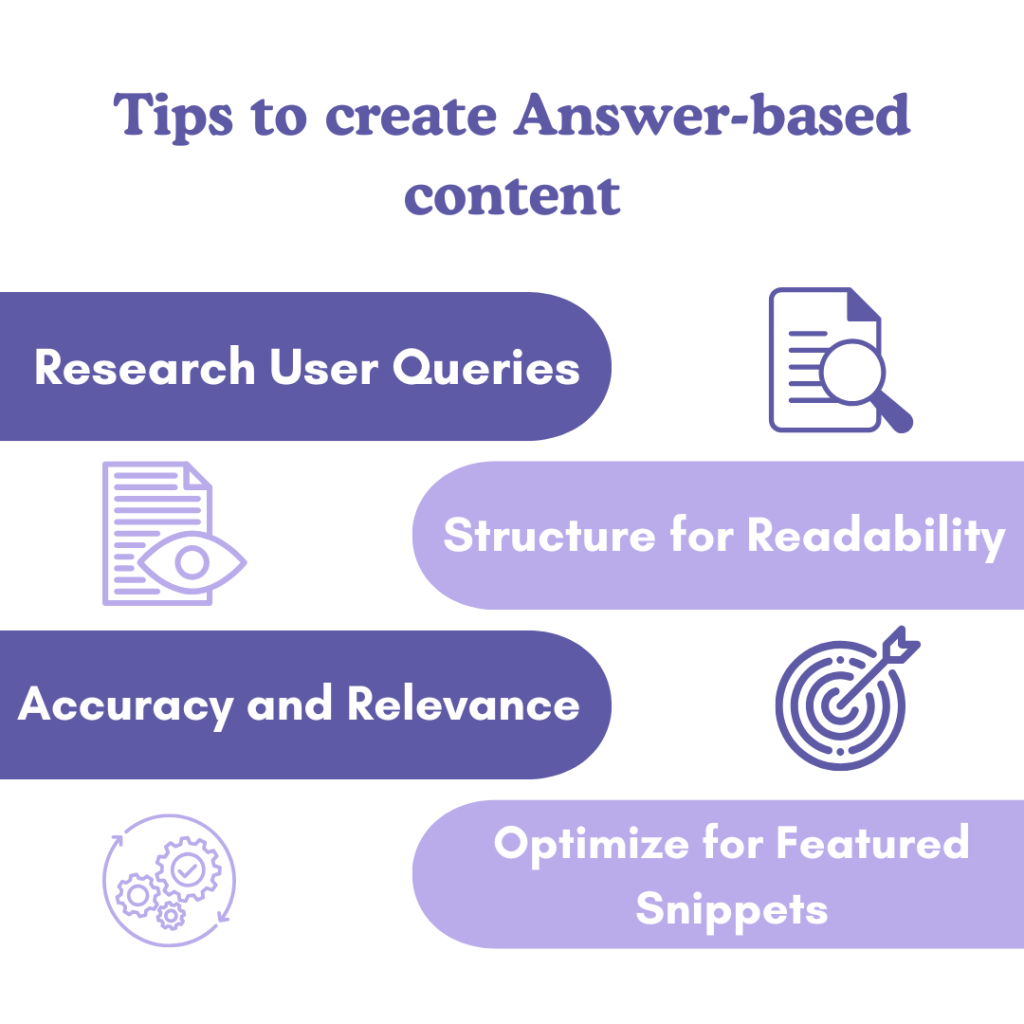
Crafting content that truly meets answer-based content requires understanding what users want, how they search, and how search engines interpret relevance.
- Research User Queries: Start by identifying the specific questions your audience is asking. Use tools like Google’s “People Also Ask,” AnswerThePublic, or keyword research platforms to uncover common search patterns.
- Structure for Readability: Answer-based content should be visually and logically organized. Use headings, short paragraphs, and bullet points to make your information easy to scan.
- Accuracy and Relevance: Each section of your content should provide reliable, updated, and factual information. Avoid overloading readers with fluff or vague explanations.
- Optimize for Featured Snippets: Write concise answers near the beginning of sections, ideally in 40–60 words. Include clear definitions, step lists, or tables where applicable.
Impact on SEO and User Engagement
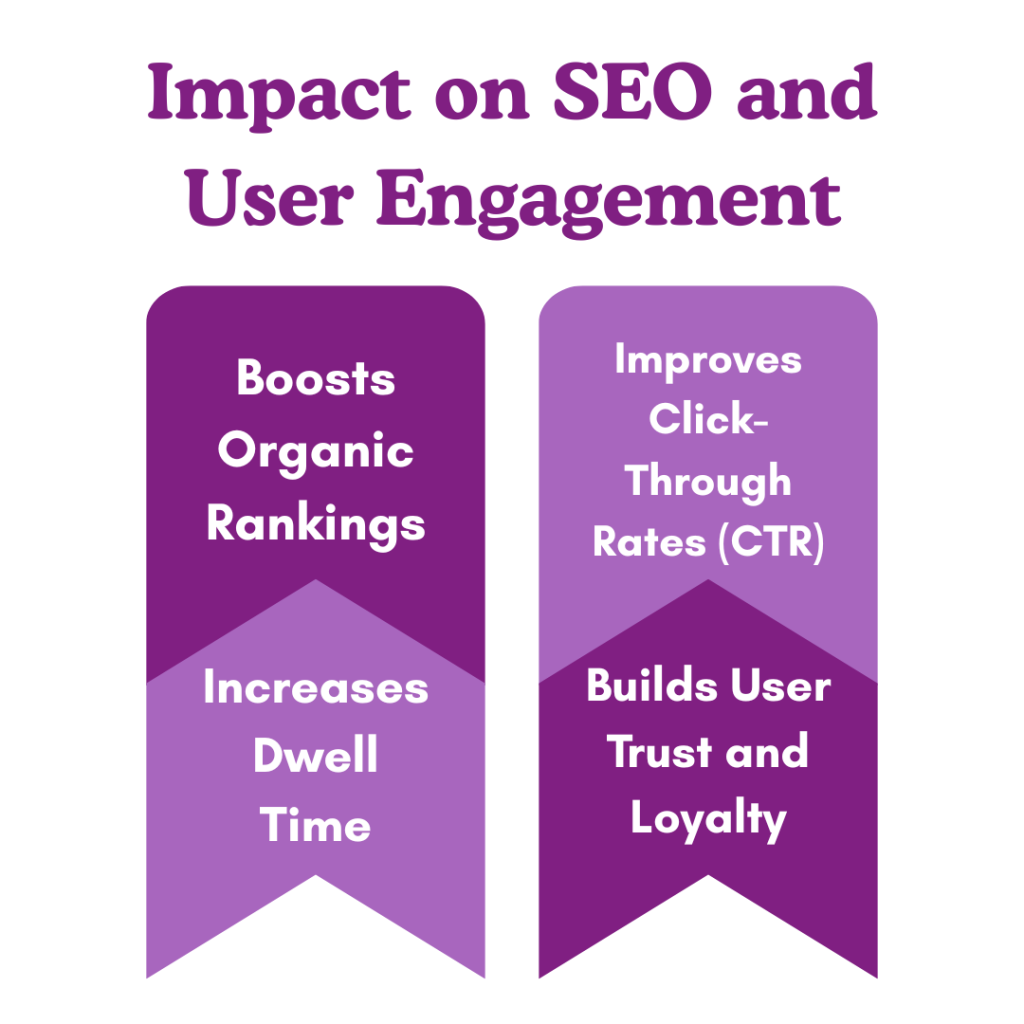
Answer-based content creates a bridge between what users seek and what search engines reward.
- Boosts Organic Rankings: Search algorithms prioritize relevance and clarity. When content provides precise answers, it signals to search engines that it’s valuable and trustworthy, leading to higher organic rankings and increased visibility.
- Improves Click-Through Rates (CTR): Concise, answer-driven titles and meta descriptions attract users scanning results pages. When searchers instantly recognize that your content holds the solution, they’re more likely to click and engage.
- Increases Dwell Time: Engaging, well-structured answers encourage users to stay longer on the page. This longer dwell time signals quality and relevance to search engines, improving overall site authority and ranking potential.
- Builds User Trust and Loyalty: When users find reliable, clear information consistently, they start associating your brand with expertise. This builds trust, encouraging repeat visits, shares, and word-of-mouth referrals over time.
Future of Answer-Based Content
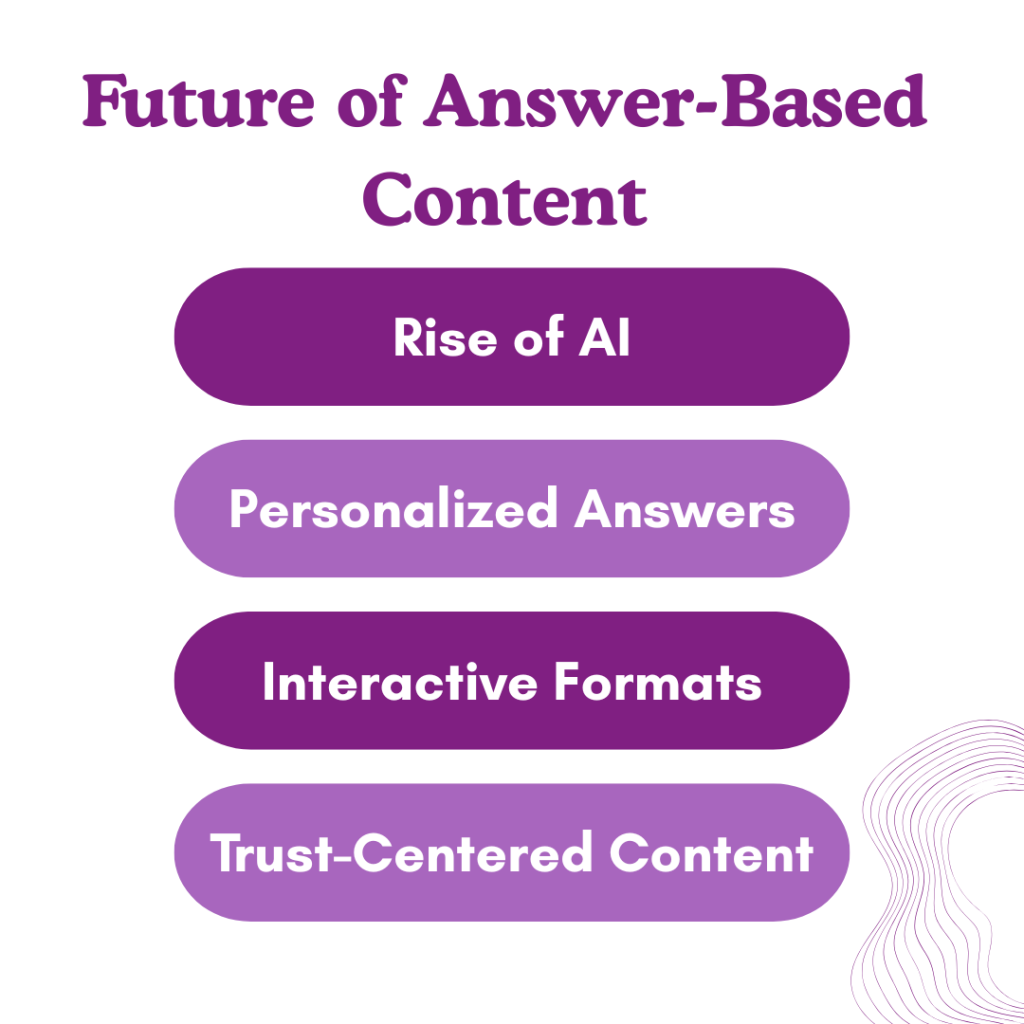
As search technology evolves, answer-based content is set to play an even greater role in how brands connect with audiences.
- Rise of AI: With the growth of AI tools and voice search, users are framing queries more naturally. Future-ready content will need to mimic conversational tones, providing direct, human-like responses that fit spoken language patterns.
- Personalized Answers: Brands will increasingly rely on data insights to predict what users want before they ask. Tailored answers — based on behavior, location, and search history — will create hyper-relevant experiences that boost loyalty and engagement.
- Interactive Formats: Answer-based strategies will move beyond text. Interactive FAQs, explainer videos, and AI chat interfaces will redefine how users consume information — making it more dynamic, intuitive, and memorable.
- Trust-Centered Content: As misinformation spreads, credibility will become the cornerstone of effective marketing. Verified data, transparent sources, and ethical communication will separate high-performing content from generic competition.
Conclusion
Answer-based content has become the backbone of modern digital marketing — a strategy that aligns user needs with brand goals. By focusing on clarity, relevance, and precision, it bridges the gap between curiosity and conversion.
As search engines evolve and AI reshapes user behavior, creating content that genuinely answers will remain the key to visibility and trust. Brands that master this approach won’t just rank higher — they’ll build lasting authority in the minds of their audience.
In a landscape overflowing with noise, the content that answers will always be the one that’s remembered.
Deepak Wadhwani has over 20 years experience in software/wireless technologies. He has worked with Fortune 500 companies including Intuit, ESRI, Qualcomm, Sprint, Verizon, Vodafone, Nortel, Microsoft and Oracle in over 60 countries. Deepak has worked on Internet marketing projects in San Diego, Los Angeles, Orange Country, Denver, Nashville, Kansas City, New York, San Francisco and Huntsville. Deepak has been a founder of technology Startups for one of the first Cityguides, yellow pages online and web based enterprise solutions. He is an internet marketing and technology expert & co-founder for a San Diego Internet marketing company.



